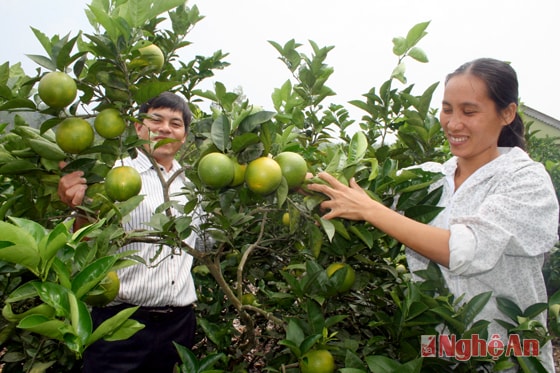Concerns about Yen Thanh orange brand
(Baonghean) - Since 2007, orange trees in Yen Thanh have grown strongly, bringing high economic efficiency and being classified as a key crop, but up to now, Yen Thanh oranges have not yet built a brand; orange growers are still struggling to find outlets for their products.
 |
| Orange garden of Ms. Nguyen Thi Luong's family, hamlet 8, Minh Thanh commune. |
| RELATED NEWS |
|---|
In Dong Thanh commune, in addition to the people's farms, there is also a business model investing in growing oranges that has developed quite effectively. A typical example is Sao Mai Joint Stock Company owned by Mr. Trinh Xuan Giao. Mr. Giao said: "Since 2004, the business has invested in Dong Trung area, Dong Thanh commune, and up to now, the total area has reached 23 hectares. The orange variety grown is Xa Doai, with large fruit, thin skin, sweet and few seeds. In 2013, the business sold 400 tons, earning 12 billion VND. This year, it is expected to harvest about 500 tons, earning an estimated 15 billion VND."
Currently, the orange growing movement is not only developing strongly in Minh Thanh and Dong Thanh communes but also spreading to many communes in the district such as Ly Thanh, Ma Thanh, Xuan Thanh... In addition to 18 households growing 100 hectares in concentration, the whole district has nearly 200 hectares including scattered planting. Orange trees are growing strongly and have great potential in the district. When it comes to harvest season, traders come to the area to buy, however, when asked for the name of the oranges, the orange sellers are still confused and offer them as Xa Doai oranges, Vinh oranges, or Minh Thanh oranges... without having a common brand for orange trees in Yen Thanh land.
To build a brand for a product, it is necessary to meet the mandatory criteria of quantity, quality, design and brand positioning. However, through actual surveys, it is true that the quality of Yen Thanh oranges has only just "touched" the standard. When accepting the "Minh Thanh Orange Restoration Project in 2007", the Acceptance Council at that time, including representatives of the Ministry of Science and Technology, the Department of Agriculture and Rural Development and provincial leaders, assessed: In terms of sweetness and aroma, Minh Thanh oranges are not inferior to Xa Doai oranges, but Minh Thanh oranges still have the disadvantage of having many seeds. According to Mr. Tran Huu Binh, a technical officer of Trinh Xuan Giao enterprise: "Currently, regarding the fertilization regime, except for large farms and experienced gardeners who have taken care of it properly, there are still many cases where it is not done scientifically. When fertilizing, it is necessary to carefully study the type of soil to know what elements are lacking or in excess in order to adjust the fertilizer, and it is not possible to use pre-processed NPK fertilizers and synthetic fertilizers. On the other hand, during the basic construction period, orange trees need to be pruned and shaped properly. All of the above factors greatly determine the quality of the oranges."
To ensure the quality of oranges, it is necessary to focus on two basic factors: varieties and care techniques. However, according to Mr. Nguyen Van Hue, an agricultural extension officer of Yen Thanh district, "Through a survey, among the 170 hectares of oranges being grown in the district, people often contact and import varieties from private traders for planting. Typically, the Van Du orange variety (imported from Hanoi), V2 (imported from Nghia Dan)... are not suitable for the local soil and weather, leading to slow growth, low productivity and poor quality. Research in the district today shows that the two orange varieties that are highly appreciated by people are Sanh orange (grown a lot in Minh Thanh) and Xa Doai orange (grown a lot in Dong Thanh). Currently, the district's Agricultural Extension Station is recommending people to use these two varieties." On the other hand, Yen Thanh's orange output is very limited, with only 2 to 3 thousand tons of fruit sold each year. Therefore, to build a separate brand for Yen Thanh oranges, it is necessary to expand the orange growing area to double or triple the current size. According to the survey, Yen Thanh oranges not only grow in the hills but can also be grown in gardens in the plains such as Vinh Thanh, Long Thanh, Khanh Thanh, Nam Thanh, so the possibility of expanding the area is very large.
Orange is a tree that takes a long time to build and requires a lot of capital. The process from land preparation to harvest is nearly 5 years, on average 1 hectare of orange requires an investment of about 250 million VND (not including land cost). But currently, according to our research, most people lack investment capital. Mr. Nguyen Khac Son - Secretary of the Dong Thanh Commune Youth Union reflected: "In early 2014, the commune established a project for 8 households to produce oranges. However, when the above households approached capital from the policy bank, they were told that the bank still did not have capital for the project." In addition, a factor that needs attention when building a brand is the residue of pesticides in oranges. Thus, in order for orange trees to stand firmly on Yen Thanh land, becoming a key tree to help people develop the economy, in addition to guiding people in fertilization and investment, the branches and local authorities need to have orientation and build a brand for the product.
Thanh Quynh
